The past, present and future: Faroe Islands women respecting, representing and making history with world championship debut
24 Nov. 2025
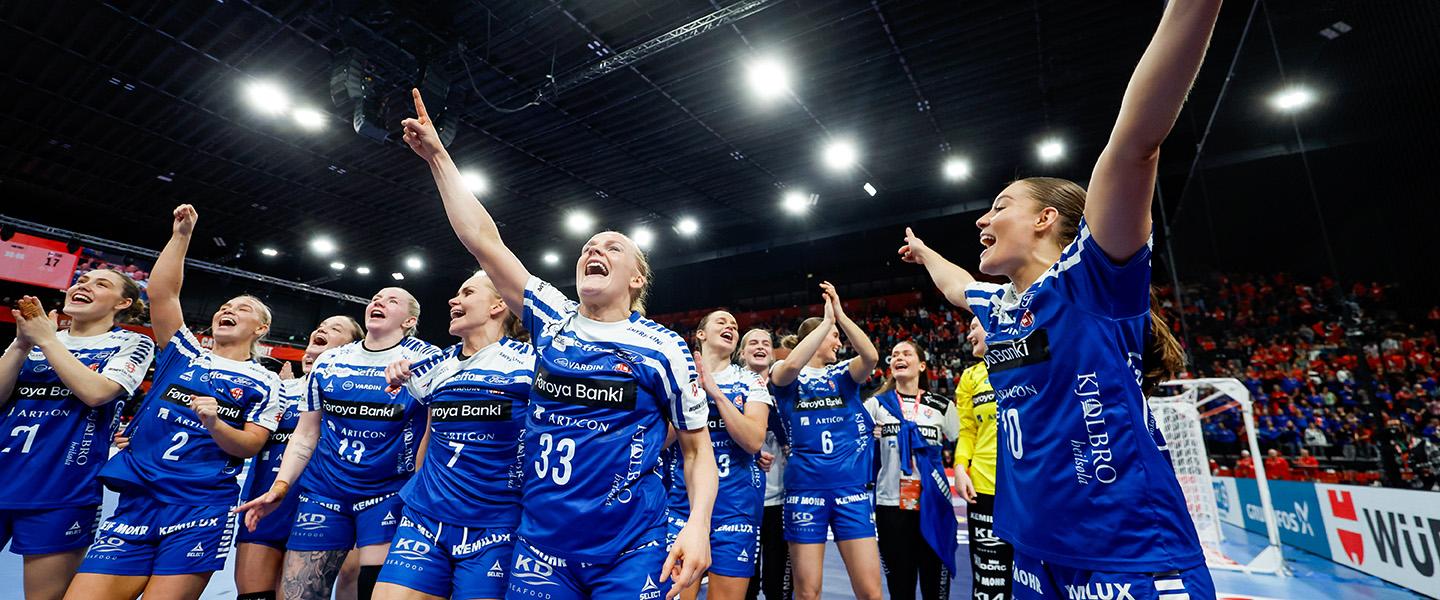
In 1974 the Faroe Islands national women’s handball team made history with their first-ever game, a full six years before the Handball Federation of the Faroe Islands was formed after becoming independent of the ‘Ítróttasamband Føroya’ (Sports Federation of the Faroe Islands).
Now, 51 years later to the month, the Faroese women are ready to appear in the 2025 IHF Women’s World Championship – the first-ever time a team from the country will appear at the senior event.
“We came into the world 50 or 60 years too early, but as players on the first national team we are proud of what is happening now and proud how we helped to pave the way, directly or indirectly.”
These are the words of Torgerð Klein, who played – and scored – in that first-ever official game on 2 November 1974 at home against Iceland in the capital Tórshavn. After losing that debut game (7:11), they played Iceland again the next day in Klaksvik, losing 7:18, but history had been made.
And history came full circle in November 2025 with the Faroese women playing their final warm-up game for the world championship against the same team at home, this time in the newly-opened national hall in Við Tjarnir, just on the outskirts of Torshavn.
The hall is almost a physical monument of the journey and continued development of handball in the country with the sport experiencing unprecedented success in recent years.
And if Klein represents the past of Faroese women’s handball on court, then the home-based Kyndil club pair of line player Bjarta Osberg Johansen – with the highest amount of national team appearances in the current squad still playing her club handball at home – and goalkeeper Gylta á Neystabø – who just made her national team debut – are the present and future, respectively.
“If someone told me 10 years ago that we will go to the world championship I would have thought it was a bad joke – that it will never happen,” says Osberg Johansen, speaking to ihf.info from the Faroes home training camp.
“Just qualifying through to the 2024 EHF Women’s European Championship qualifiers was huge, and I still remember those games, because they were so huge, and then, playing in the EURO, and now a World Championship. I would never imagine it.”
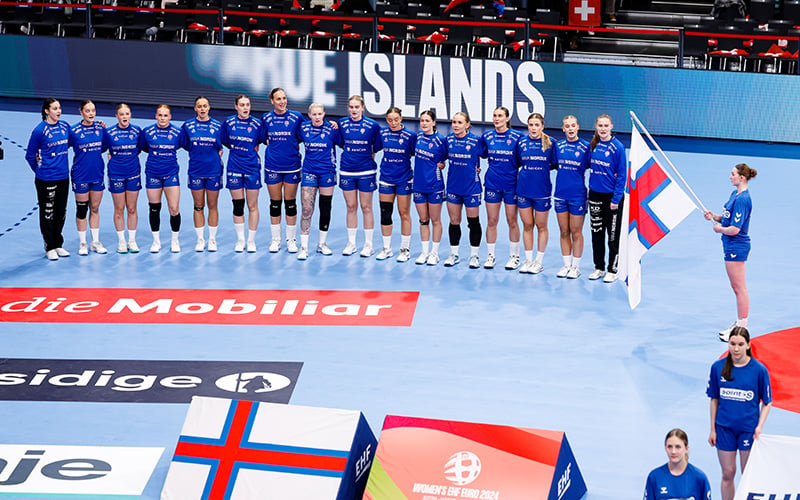
First EURO, now World Championship
Exactly one year ago, after beating Luxembourg twice in a qualification group also featuring Sweden and Iceland, the Faroes women found themselves at their debut European championship, throwing-off their campaign against co-hosts Switzerland in Basel before taking on Croatia and eventual runners-up Denmark.
Despite losses against the Swiss (28:25) and the Danes (33:24), their 17:17 draw against 2020 bronze medallists Croatia ensured that the side had something on court to take home as a memory as well as memories off court too.
“We had this close game against Sweden in qualifying when we lost by four (31:27) and then our qualification was confirmed in that April after we lost against Iceland (24:20 but qualified as the final best-placed third-placed team in qualifying) and that was really big,” says the 32-year-old Osberg Johansen, who has been with the national team since 2012.
“When we were in Switzerland, just seeing all those people, my family and friends who came all the way to support us was so huge. I still get goosebumps from that, even though they were only 500 people out of 5,000 there. It was big to get a point against Croatia, but all of these people supporting us – that was the most memorable part of the journey.”
One of those not in Switzerland, but inspired by what was unfolding in front of her, was the then 17-year-old junior player Gylta á Neystabø.
“Me and some other younger players watched the games at home. It was very big and it was the same feeling as when the men’s side played at the EURO for the first time (in January 2024),” says the goalkeeper.
“It was a big topic for everyone. It was everywhere, on Facebook, social media and it seemed like everyone painted their face and everyone went – there was no-one left in the Faroe Islands, it was empty.”
And those faces are set to be painted once more as April again proved to be a happy month for Faroese women’s handball, an aggregate 65:56 European qualifiers win over Lithuania ensuring a ticket to Germany/Netherlands 2025.
After winning the first leg clearly at home (36:26), four days later the Faroes travelled to Lithuania, where they lost 30:29, but despite the defeat, booked that golden world championship ticket.
“3,000 spectators were cheering for us and that really lifted us up – everyone we knew in the Faroes was there,” said Osberg Johansen about that first leg at home in the impressive new hall.
“Everything worked. It was an amazing game and many players were shining, but even though you have success in one game, just a few hours afterwards, if you play against the same team and you're not prepared mentally, you can lose, especially at the national team level. In the second game, mentally we weren't there and we were terrible, but, luckily, we had such a good game at home that it didn't matter.”
So tickets could be booked for a trip to Trier, Germany, where the Faroes will face Montenegro, Spain and Paraguay in the preliminary group stage and should both teams qualify, a main round date with familiar foes Iceland.
“I was with my kids and said to them; ‘I need to listen to this’,” explains Osberg Johnasen about tuning in for the group draw last May. “I remember thinking, ‘Montenegro OK, they are not the highest-ranked team in pot 1, Paraguay from pot 4 OK, and then we got Spain in pot 2 – a really good team. I was hoping for someone else, but that was the same in the EURO when we got Croatia – it is the same feeling with Spain. We like playing against heavy, slow players and love shooters and not playing against our own medicine: one-against-one.
“Faroese people in general like to be underdogs and we love the story that we're small in terms of population, but we want to be known more for fighting and giving our all; players, coaches or fans. Most of all, we are proud of coming from the Faroe Islands, and that is the thing that we are showing most of the time. We want to have a good fight and that's something we work a lot on with our mental coach: we show everyone else ourselves every game, every minute, every second that we fight for our team and we stand together.”
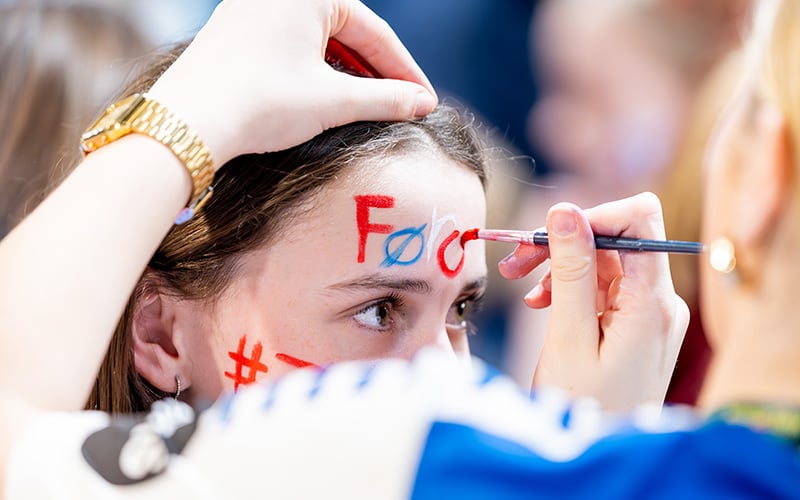
Whatever happens at Germany/Netherlands 2025, the Faroes will be guaranteed to play more than the trio of games they played at the EURO, valuable experience for a squad finding their feet on the global stage.
“Of course, we want to qualify to the main round. We will play more than three games this time so we need all of our best players can’t play 60 minutes in all games, so, hopefully, our other players will grow with this. If we are going to survive this, many players need to step up, but I think that these players are ready to take that step and it would be really great to see,” she added.
“We have never had such a good squad and this is the highest level of overall play of all the players. There were so many good back players this time, for example, and the competition (for a squad place) now is much stronger than it was one year ago.”
One of those players is the now 18-year-old goalkeeper Gylta á Neystabø who will be 19 in mid-December and who, at the time of the interview, had just made her first senior training camp.
“It has definitely been a big dream for me to be in the senior team because I knew that this was my last year with the junior team,” said the player, speaking to ihf.info before knowing of her inclusion in the final squad.
“We have so many big goalkeepers and the career of one can be long, playing into their 40s, like (Norway’s) Katrine Lunde, but It would mean a lot to me to be in the squad. Anika (Fríðheim Petersen) is a very good goalkeeper – she had a baby but will be strong again – Rakul (Wardum) is a very good goalkeeper and there's a lot of younger girls also fighting to get on the team.
“They were very welcoming and nice,” added the youngster about turning up to her first day of senior training. “I was really nervous, you know, it's a lot of pressure. They had some rituals; they always give hugs to everybody when they meet so they gave me a hug and then said hello, and then I had some conversations with the players who I haven't seen for a long time, because they play in Denmark.
“I'm very excited though, the coaches gave me some things I need to focus on and improve on, like my fast-breaks and stuff like that, so I'm trying really hard to get to the level where they expect me to be able to compete at a world championship – I am just very happy to have the chance to try. I loved training and the demands they set for me because it gives me specific things to focus on to help me become better and I know what they will demand next time.”
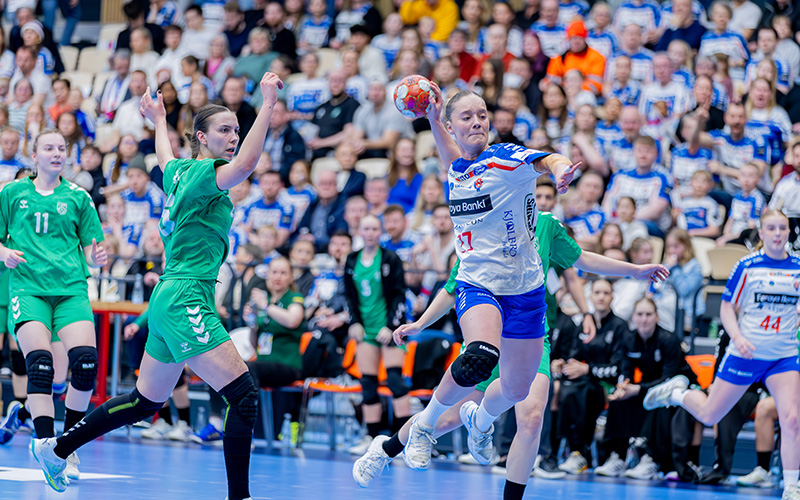
A long and continued road of development
á Neystabø represents the future of Faroese women’s handball and the options presented to her now (“I have handball dreams and educational dreams; I would love to go to Denmark for university and handball”) in many ways represent not only sporting but wider social changes in the archipelago nation in the North Atlantic Ocean.
And, as far as a handball court is concerned, Torgerð Klein and her team from the 1970s were pioneers of that.
“Like everything else in society, the game of handball has been through a development over the years it has been played in Faroe Islands,” says Klein, with her sister Svanna and Rannvá Hanusardóttir adding their thoughts too.
“It is a good feeling to know that what did not work so well for our generation of handball players, works now for the national team which is now in a stable position. We can only hope that we can stick to the system that is now being implemented.
“In the 1970s and 1980s there were few matches, the matches did not hang together as a whole, and the preparation for the individual matches was not always good enough. But many had the joy and good memories of having played championship-league club matches, because for those matches a lot was done out of the newspapers. The preparations were many and good and gave good cohesion in the clubs.”
That club cohesion has underpinned the development of Faroese women’s handball for decades, and even when Bjarta Osberg Johansen joined the senior team, it was the constant, when the national team was still finding its feet.
But since starting her journey with the national team, the growth of the sport can be plotted against her own career, one which started in a traditional Faroese way.
“To be honest, when I started with the national team back in 2012 it was horrible – we didn't play games at all, we had friendly games every three or four years, maybe,” says the player, who moved to Denmark when she was 17 and went to school in Ikast to play football as a goalkeeper, becoming under 18 Danish champion and playing for Team Viborg with Denmark international and Bayern Munich player Pernille Harder, as well as representing her country in the 2015 FIFA World Cup, European qualification.
“Now, we have two women's clubs in Tórshavn where I am, and around six other clubs across the Faroe Islands – for example, when we have a derby match coming up in Tórshavn we train in the same hall at the same time, with just a curtain splitting us.
“Typically in the Faroes, you start playing handball because your friends are doing it, and where I grew up, at the same club as Jana Mittun (Viborg HK), our school was right beside the playing hall and that’s typical for many of the teams – it’s really normal that when you're off from school, you just walk into the hall and have handball practice, so it’s very easy to train, plus, you don’t just play one sport, there are multiple sports in the hall – when I was young I also played football and was on the national team until I was 22-years-old.
“Handball has now become a year-round sport. Before, it was a summer sport, so now it is not possible to do two sports if you want to be on a high level because the strain on your body with the different movements is too much, especially when you compare a line player in handball to a goalkeeper in football, like me,” she adds.
“Still, here in the Faroes I am not a full-time professional – in fact, we have very few professional handball players on our national team. I work around 40 hours a week as a researcher at the Faroe Islands Environmental Agency and then train four times a week with my club, strength train three times a week and then play a game a week. Plus I am a mum too – I have two daughters; one just turned three and one who is five.”
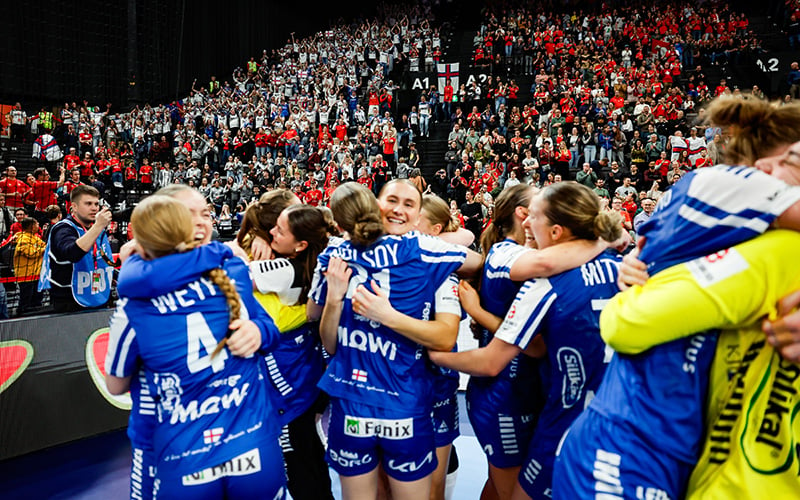
Life-changing moments
But that hard work, sacrifice and commitment has paid off for Osberg Johansen, with recognition coming from across the country and from those it means the most for – the next generation.
“First of all, I am a mother, but when I take my kids to a birthday party or something like that, there are girls there stopping with their mouths open, just looking at me,” says the line player with a slight hint of shyness – a common theme amongst the humble current and former players IHF.info spoke to.
“And then their mums or dads are coming and saying to me: ‘she's such a big handball fan’. A few weekends ago I was with my oldest daughter in a shopping centre, and a girl came over asking for an autograph and the next day two girls came over asking for a picture. My daughter said to me ‘Mum, why are people wanting to have a picture and have a photograph? It's really strange’. Even at work the son of my boss asked to come to work just so he could get my autograph.
“That would not have happened 12 years ago, as only those who were interested in handball would have done that, but many people know us now and it's really fun and cute.
“But, most of all, I'm glad that they have players who they can look up to now who are female. That's really important. Because even though you have Óli (Mittún) and Elias (Ellefsen á Skipagøtu) who are good, they are men, and it's not the same for a girl to have a male role model as it is to have a female role model – we are different.”
And even the 19-year-old á Neystabø has noticed it. “In the last five or so years the women's team really have become idols for the kids,” says the player, who played at the 2025 EHF Women’s Junior European Championship in Montenegro in July.
“Before, it was just more at a distance. You didn't really hear much about them. You knew they were there but now they're more active than when I was little, even though it was not that long ago.
“Everybody's talking about the team going to the world championship. It’s a massive step for handball in the Faroe Islands, and it feels different playing, because it feels bigger. In the clubs, everybody's more motivated, because everyone wants to make the national team.
“All the kids are very excited and starting to play handball because they see us and see that it's doing so well – they idolise Jana, everybody wants autographs from her or a picture with her; Elias and Oli too. All of them – it’s very fun.”
51 years ago 12 women made history for the Faroe Islands and in just a few days, they can watch history live in front of them and witness their legacy in action five decades later.
“We hope that they will do well, that they will not lose heart, but stick together, both when it goes well and no less when it goes against,” says Klein about the 2025 squad. “We are glad that they have come so far and wish them all the best.”
1974 history-makers: The first-ever Faroe Islands women national team
Torgerð Klein played in the first-ever Faroe Islands women’s national team games 51 years ago. In her own words, she tells ihf.info her memories of that time.
In the late 1960s and early 70s, the men's national handball team had played matches, and, of course, it affected the handball-loving girls who longed to experience what the men had.
It seemed a bit unrealistic that it would happen that the girls also got the chance to join a national team, but the attitude in many places was that handball was a game for girls, perhaps especially for the girls of the boys who played football.
Eventually, the girls got their first national game exactly 10 years after the men. It was the Icelanders who offered to come to the Faroe Islands to play against a women's national handball team. The ÍSF (Ítróttasamband Føroya’ (Sports Federation of the Faroe Islands) considered the offer both in the executive committee and the handball committee and decided to accept the offer in order to stimulate women's handball.
And so it was very exciting when it was announced in the summer of 1974 that the Icelandic women's national team would come to the Faroe Islands to play that same autumn. A qualifying tournament for potential national team players was then organised, the first of its kind in the history of sports in the Faroe Islands, with 20 players taken for training and 12 making the team.
For the first game there were preparations for joint training, but the training conditions were not good. At that time, there were only two handball halls in the Faroe Islands – at Klaksvík, built in 1968, and in Havn (Tórshavn), which came in 1970. In Havn, five clubs owned the hall together and had to divide their training times equally, so it was difficult for other clubs to get hours.
In the two games the Icelandic team was much better than ours, both stronger and more agile. Their defence was much harder to play against than we were used to and we lost both games.
At that time, our national championship was still an outdoor competition in the summer so the level of training and experience were not on par with the Icelandic players, plus the experience of the Faroese team to play games at a higher level than what was in the domestic competition, were virtually none. There was no television then, so we knew nothing about the game except what we saw at home.
The media made quite a lot out of the event itself and the matches. After the matches both players and managers/coaches were invited to a meeting, where representatives of the authorities and the ÍSF gave a speech. The players were praised for the great effort made in connection with the preparations.
Following this, the women's national team played another match in Iceland in 1977. The intention was that it would be a four-country competition between Iceland, the Netherlands, the Faroe Islands and the USA, but the USA could not attend, so Iceland played with two teams.
In 1980, eight national games were played, but it took 16 years before a national game was played again as the interest of the ISF and its handball successor HSF (Hondboltssamband Foroya – Handball Federation of the Faroes Islands) in keeping a women's national team going was not there.
Therefore, the best women did not fulfil their ambitions to test themselves on the national team at the international level, but just in their own clubs. For example, the women of HC Neistin played in European competitions four times from 1979-1987.
As national team players in the 1970s we didn't think about things like the European or world championships, more with the domestic clubs. We dreamed of championships and being able to compete with the best.
The Faroe Islands are a small society, and small societies also have their advantages. We are few, and in a handball match we play seven against seven.
Those who play at the highest level have now played regularly since they were small and been in training as handball players. Most of them have had professional coaches and have been at professional handball academies elsewhere and now play for semi- or fully-professional teams in other countries.
Yes, it's a feat that they've come this far, but it doesn't come out of nowhere – the game has different qualities today than it had 50 years ago, but handball culture in the Faroes has been going on throughout the years.
Squad: Sigrid Andreasen mál, Jónfríð Sólbjørg, Jakobina Joensen, Súsanna Michaelsen, Jóhanna Andreasen, Marjun á Plógv mál, Hallgerð Midjord, Guðrun Dalsgarð, Margit Frisdahl, Erla Olsen, Torgerð Klein, Svanna Hanusardóttir. Coaches: Niels Nattestad, Vagnur Michelsen
First-ever official national team games
Saturday 2 November 1974
Faroe Islands vs Iceland 7:11
Faroe Islands scorers: Svanna Hanusardóttir 4, Jónfríð Sólbjørg 2, Torgerð Klein 1
Sunday 3 November 1974
Faroe Islands vs Iceland 7:18
Faroe Islands scorers: Svanna Hanusardóttir 4, Jakobina Joensen 2, Jonfríð Sólbjørg 1
With thanks to Ári Rouch
Photo credit: EHF / Kolektiff / Nebojsa Tejic; Faroe Islands Handball Federation / Andrei Antal

